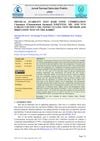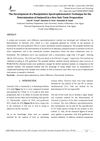 June 2023 in “MPI (Media Pharmaceutica Indonesiana)”
June 2023 in “MPI (Media Pharmaceutica Indonesiana)” A hair tonic made from kale leaves is effective for hair growth and meets Indonesian standards.
 November 2023 in “International journal of Ayurveda and pharma research”
November 2023 in “International journal of Ayurveda and pharma research” The herbal hair oil effectively promotes hair growth, nourishes the scalp, and prevents dandruff.
1 citations,
May 2021 in “Research journal of topical and cosmetic sciences” Muttaijow ComplexTM improved skin, hair, and nail health in middle-aged adults.
May 2021 in “Research journal of topical and cosmetic sciences” TrichovitalsTM improved skin, hair, and nail health in adults after 12 weeks.
 32 citations,
January 2008 in “Journal of Microencapsulation”
32 citations,
January 2008 in “Journal of Microencapsulation” Cosmetics with hinokitiol-loaded nanocapsules were found to effectively promote hair growth.
 August 1994 in “Drugs & Therapy Perspectives”
August 1994 in “Drugs & Therapy Perspectives” Psoriasis treatments range from topical creams to systemic medications with serious side effects, and while treatments can manage symptoms, there is no cure.
December 2023 in “Asian journal of beauty & cosmetology”  December 2023 in “International journal of research in dermatology”
December 2023 in “International journal of research in dermatology” Adding PRP to topical mometasone improves and speeds up alopecia areata treatment.
10 citations,
February 2014 in “Fitoterapia” Pomiferin may improve skin and hair by increasing important protein production.
 211 citations,
February 2009 in “European journal of pharmaceutics and biopharmaceutics”
211 citations,
February 2009 in “European journal of pharmaceutics and biopharmaceutics” Hair follicles help absorb and store topical compounds, aiding targeted drug delivery.
 2 citations,
April 2021 in “Naukovì gorizonti”
2 citations,
April 2021 in “Naukovì gorizonti” Effective treatment significantly improves pododermatitis in dogs, reducing symptoms and extending remission.
 30 citations,
November 2008 in “Facial Plastic Surgery”
30 citations,
November 2008 in “Facial Plastic Surgery” The conclusion is that the best approach for treating Female Pattern Hair Loss is a combination of different treatments.
 15 citations,
March 2012 in “British journal of dermatology/British journal of dermatology, Supplement”
15 citations,
March 2012 in “British journal of dermatology/British journal of dermatology, Supplement” Using specific cleansers and moisturizers with niacinamide improves men's skin hydration and health.
 2 citations,
January 2022 in “Lasers in Medical Science”
2 citations,
January 2022 in “Lasers in Medical Science” Using a carbon dioxide laser and platelet-rich plasma together can effectively restore hair and patients are generally satisfied with the results.
 1 citations,
July 1965 in “Postgraduate medicine”
1 citations,
July 1965 in “Postgraduate medicine” Most skin conditions can be managed with general medical knowledge.
 4 citations,
December 2010 in “Copernican Letters”
4 citations,
December 2010 in “Copernican Letters” Synthetic polypeptides in cosmetics may help with anti-aging, but their effectiveness on real skin is uncertain.
 16 citations,
April 2017 in “Journal of Cosmetic Dermatology”
16 citations,
April 2017 in “Journal of Cosmetic Dermatology” Ficus carica leaf extract may help treat skin disorders by reducing inflammation and androgen effects in skin cells.
 May 2023 in “Jurnal farmasi sains dan praktis”
May 2023 in “Jurnal farmasi sains dan praktis” The hair tonic with cinnamon oil and coconut oil was stable and caused very mild irritation.
 December 2024 in “Tropical Journal of Natural Product Research”
December 2024 in “Tropical Journal of Natural Product Research” The developed carrier may improve hair growth treatments using brown algae extract.
 December 2019 in “International journal of scientific research in science and technology”
December 2019 in “International journal of scientific research in science and technology” Researchers developed a simple, low-cost method to accurately measure Aminexil in hair tonic.
 July 2019 in “Facial Plastic Surgery Clinics of North America”
July 2019 in “Facial Plastic Surgery Clinics of North America” New techniques and technologies are improving facial plastic and reconstructive surgery.
 35 citations,
January 2006 in “Journal of Dermatological Treatment”
35 citations,
January 2006 in “Journal of Dermatological Treatment” Zinc can help with some skin problems, but its effectiveness varies depending on the condition.
 2 citations,
June 2021 in “Cosmoderma”
2 citations,
June 2021 in “Cosmoderma” Platelet-rich plasma (PRP) shows promise in skin and hair treatments but results vary with preparation methods.
 27 citations,
January 2013 in “Indian Journal of Dermatology, Venereology and Leprology”
27 citations,
January 2013 in “Indian Journal of Dermatology, Venereology and Leprology” PCOS is a complex disorder managed by treating symptoms and requires a team of specialists.
 108 citations,
November 1980 in “British Journal of Dermatology”
108 citations,
November 1980 in “British Journal of Dermatology” Oral retinoids are effective for various skin conditions but have side effects and should not be used during pregnancy.
136 citations,
April 2010 in “British Journal of Dermatology” Acitretin is effective for severe skin conditions but has significant side effects and requires careful monitoring.
 August 1994 in “Drugs & Therapy Perspectives”
August 1994 in “Drugs & Therapy Perspectives” The document concludes that H2-antagonists and proton pump inhibitors are highly effective for ulcers, eradicating Helicobacter pylori is important to prevent recurrence, and misoprostol helps with NSAID-related ulcers.
81 citations,
January 2000 in “American journal of clinical dermatology” Various treatments can improve post-acne scars, but results vary.
 20 citations,
January 2009 in “Chemical Papers”
20 citations,
January 2009 in “Chemical Papers” Both HPSAM and PLS methods accurately measure minoxidil and tretinoin concentrations.
 100 citations,
June 2011 in “Journal of The American Academy of Dermatology”
100 citations,
June 2011 in “Journal of The American Academy of Dermatology” 5% minoxidil foam once daily works as well as 2% minoxidil solution twice daily for female hair growth and is more convenient.
























